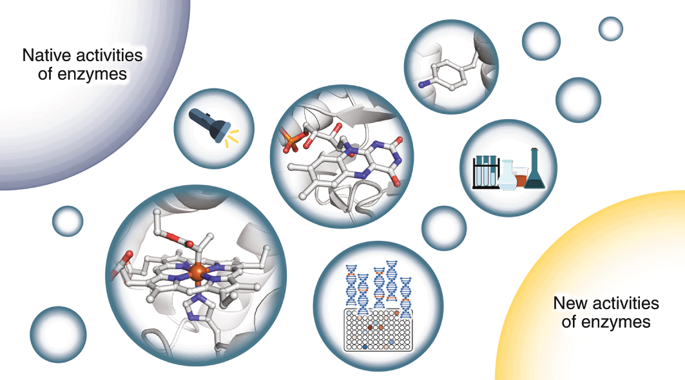Nature Catalysis ( IF 42.8 ) Pub Date : 2020-01-20 , DOI: 10.1038/s41929-019-0385-5
Kai Chen , Frances H. Arnold

|
The efficiency, selectivity and sustainability benefits offered by enzymes are enticing chemists to consider biocatalytic transformations to complement or even supplant more traditional synthetic routes. Increasing demands for efficient and versatile synthetic methods, combined with powerful new discovery and engineering tools, has prompted innovations in biocatalysis, especially the development of new enzymes for precise transformations or ‘molecular editing’. As a result, the past decade has witnessed an impressive expansion of the catalytic repertoire of enzymes to include new and useful transformations not known (or relevant) in the biological world. In this Review we illustrate various ways in which researchers have approached using the catalytic machineries of enzymes for new-to-nature transformations. These efforts have identified genetically encoded catalysts that can be tuned and diversified by engineering the protein sequence, particularly by directed evolution. Discovery and improvement of these new enzyme activities is opening a floodgate that connects the chemistry of the biological world to that invented by humans over the past 100 years.
中文翻译:

工程化酶中的新催化活性
酶提供的效率,选择性和可持续性优势正诱使化学家考虑进行生物催化转化,以补充甚至替代更传统的合成路线。对高效和通用合成方法的需求不断增长,再加上功能强大的新发现和工程工具,促使了生物催化领域的创新,尤其是开发用于精确转化或“分子编辑”的新酶。结果,在过去的十年中,酶的催化库有了令人印象深刻的扩展,包括了生物界未知(或相关)的新的有用的转化。在这篇综述中,我们说明了研究人员利用酶催化机制进行新自然转化的各种方法。这些努力已经确定了可以通过工程化蛋白质序列,特别是通过定向进化来调节和多样化的遗传编码的催化剂。这些新酶活性的发现和改进打开了一个闸门,将生物世界的化学与人类过去100年来发明的化学化学联系起来。

































 京公网安备 11010802027423号
京公网安备 11010802027423号